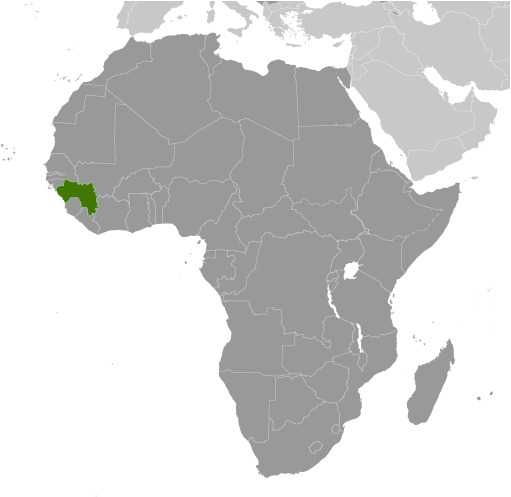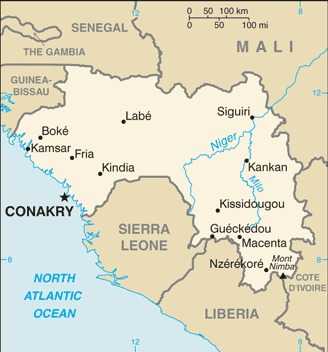Introduction
Background
Before the Europeans arrived in the 16th century, multiple kingdoms controlled the area that is modern-day Guinea, and Islam was introduced in the 11th century. Guinea is at a turning point after decades of authoritarian rule since gaining its independence from France in 1958.
Geography
Area
total: 245,857 sq km
land: 245,717 sq km
water: 140 sq km
Climate
generally hot and humid; monsoonal-type rainy season (June to November) with southwesterly winds; dry season (December to May) with northeasterly harmattan winds
Natural resources
bauxite, iron ore, diamonds, gold, uranium, hydropower, fish, salt
People and Society
Population
total: 13,986,179
male: 6,985,606
female: 7,000,573 (2024 est.)
Ethnic groups
Fulani (Peuhl) 33.4%, Malinke 29.4%, Susu 21.2%, Guerze 7.8%, Kissi 6.2%, Toma 1.6%, other/foreign 0.4% (2018 est.)
Languages
French (official), Pular, Maninka, Susu, other native languages
Religions
Muslim 85.2%, Christian 13.4%, animist 0.2%, none 1.2% (2018 est.)
Population growth rate
2.74% (2024 est.)
Government
Government type
presidential republic
Capital
name: Conakry
Executive branch
chief of state: President Col. Mamady DOUMBOUYA (since 1 October 2021); note - on 5 September 2021, Col. Mamady DOUMBOUYA led a military coup in which President CONDE was arrested and detained, the constitution suspended, and the government and People's National Assembly dissolved; on 1 October 2021, DOUMBOUYA was sworn in as transitional president
head of government: Prime Minister Mamadou Oury BAH (since 29 February 2024); note - on 19 February 2024, Guinea's military leaders dissolved the government of Prime Minister Bernard GOUMOU; on 27 February 2024, Guinea's military leaders appointed Mamadou Oury BAH as prime minister
Legislative branch
description: formerly the People's National Assembly; note - on 5 September 2021, Col. Mamady DOUMBOUYA led a military coup in which President CONDE was arrested and detained, the constitution suspended, and the government and People's National Assembly dissolved; on 22 January 2022, an 81-member Transitional National Council was installed; on 19 February 2024 Guinea's military leaders dissolved the government
Economy
Economic overview
growing but primarily agrarian West African economy; major mining sector; improving fiscal and debt balances prior to COVID-19; economy increasingly vulnerable to climate change; slow infrastructure improvements; gender wealth and human capital gaps
Real GDP (purchasing power parity)
$37.408 billion (2022 est.)
$35.729 billion (2021 est.)
$34.388 billion (2020 est.)
Real GDP per capita
$2,700 (2022 est.)
$2,600 (2021 est.)
$2,600 (2020 est.)
Agricultural products
cassava, rice, groundnuts, oil palm fruit, maize, fonio, plantains, potatoes, sweet potatoes, yams (2022)
Industries
bauxite, gold, diamonds, iron ore; light manufacturing, agricultural processing
Exports
$8.898 billion (2022 est.)
$10.266 billion (2021 est.)
$8.996 billion (2020 est.)
Exports - partners
China 37%, India 27%, UAE 25%, Switzerland 3%, Spain 2% (2022)
Exports - commodities
gold, aluminum ore, coconuts/Brazil nuts/cashews, cocoa beans, fish (2022)
Imports
$5.749 billion (2022 est.)
$5.353 billion (2021 est.)
$6.314 billion (2020 est.)
Imports - partners
China 37%, India 10%, Netherlands 8%, UAE 4%, Belgium 4% (2022)
Imports - commodities
refined petroleum, rice, garments, plastic products, wheat (2022)
Exchange rates
Guinean francs (GNF) per US dollar -
Exchange rates:
9,565.082 (2020 est.)
9,183.876 (2019 est.)
9,011.134 (2018 est.)
9,088.319 (2017 est.)
8,967.927 (2016 est.)
Page last updated: Wednesday, May 15, 2024




